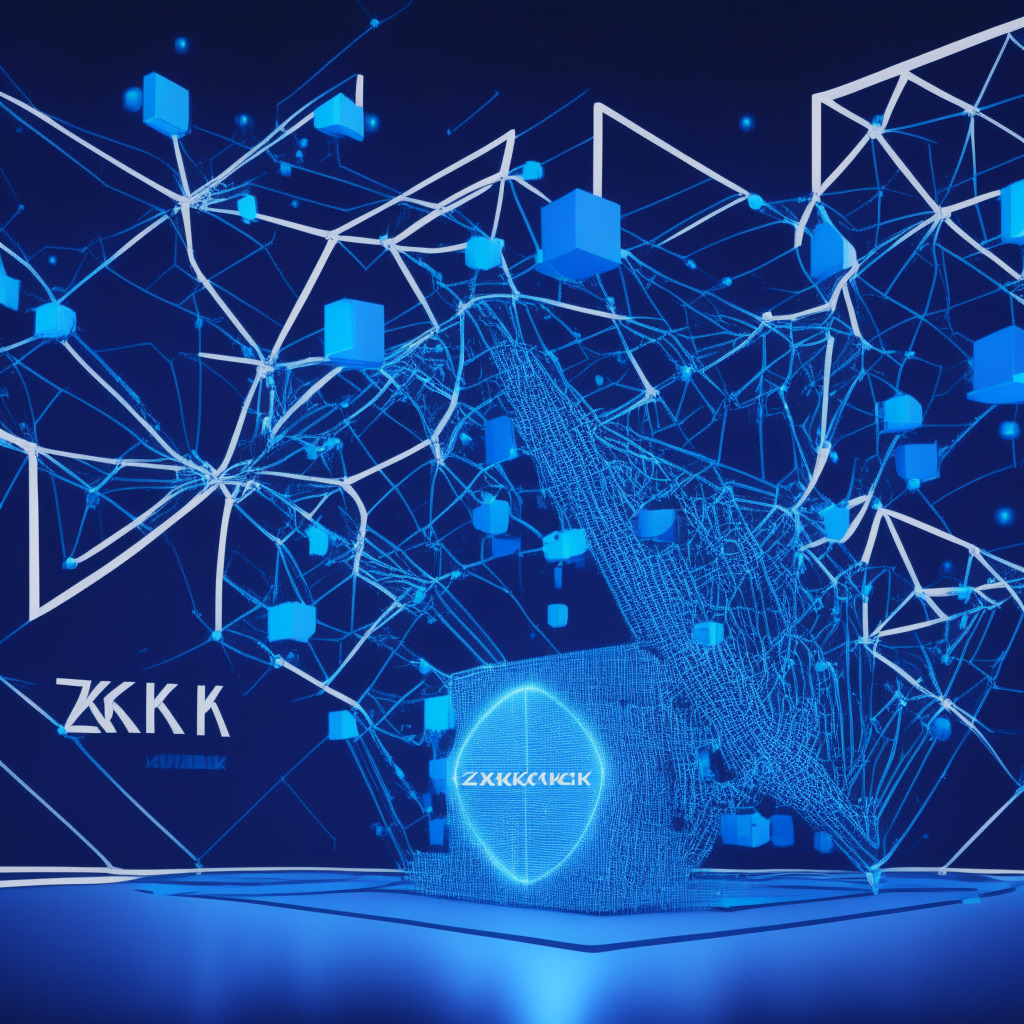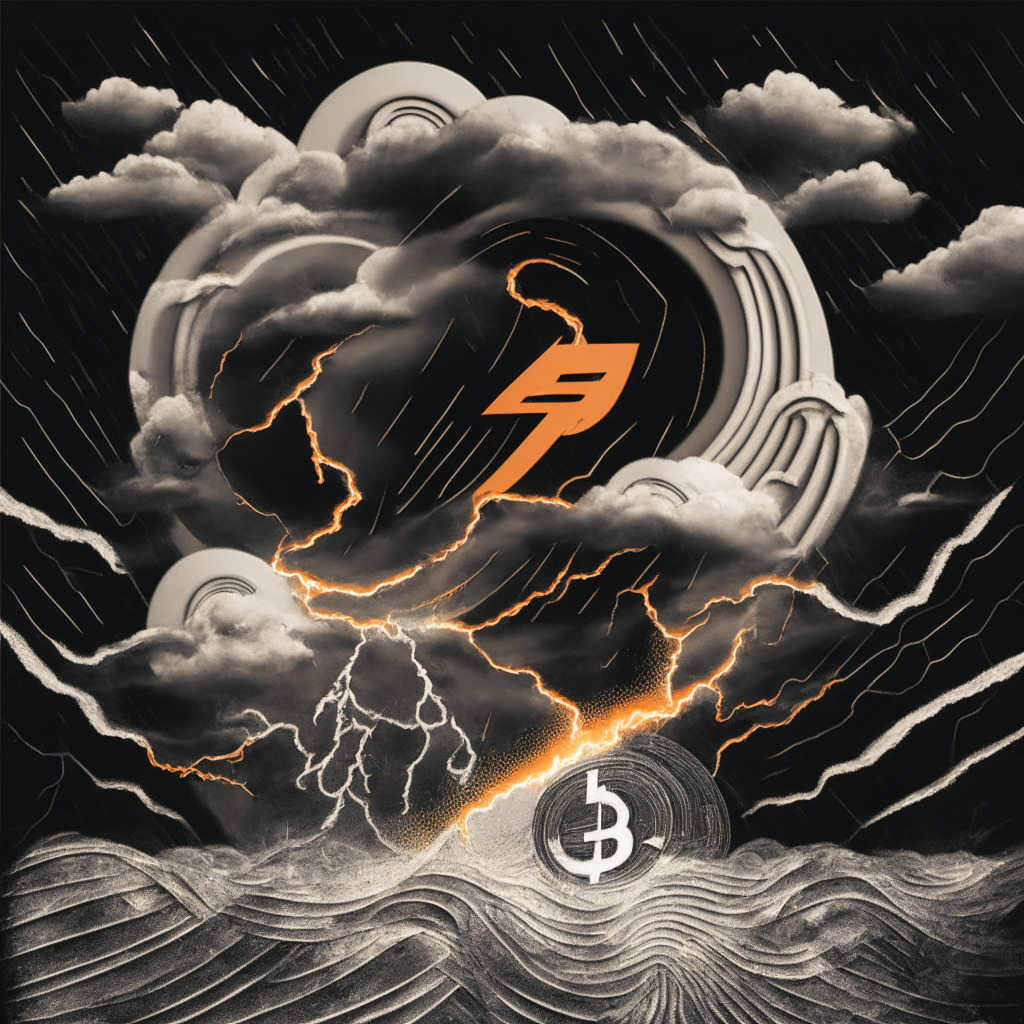Coinbase’s layer 2 blockchain, Base, sets record daily transactions, thanks to FriendTech, a decentralized social network platform built on Base. Despite a recent decrease, rekindled Base activity suggests network maturation. This strong start, unaffected by Ethereum’s congestion and fees, could indicate sustainable future growth with “layer-2” networks.
Search Results for: blockchain
Ethereum’s New Testnet Holesky: A Gargantuan Leap in Blockchain Scalability and Sustainability
“Ethereum developers initiate new test network, Holesky, doubling the capacity of the main network. Commemorating Ethereum’s transition to a ‘proof-of-stake’ blockchain, Holesky offers an environment for developers to experiment and address scalability issues, aiming to replace the existing Goerli testnet by 2024.”
ANZ Joins Hands with Chainlink for a Blockchain Future: The Novelty and Controversy Explored
Australia’s big four bank, ANZ, has successfully conducted a test transaction with Web3 services platform, Chainlink, marking a significant move towards embracing tokenized assets. Utilizing Chainlink’s Cross-Chain Interoperability Protocol (CCIP), ANZ simulates the purchase of a tokenized asset adopting a ‘test-and-learn’ approach.
Navigating the Green and Risky Terrain: ABN Amro’s Blockchain Innovation and the Hard Lessons of Tech Adoption
“Amid growing blockchain adoption, Dutch bank ABN Amro executed a digital green bond offering through a Polygon-powered platform, Tokeny, raising €5 million for green asset refinancing. Despite benefits, errors in the Paxos infrastructure, resulting in large overpayments, underline the risks and need for effective prevention strategies in this tech frontier.”
Cryptocurrency Heist: A Wake-Up Call on the Need for Elevated Security Measures in the Blockchain Landscape
A suspicious withdrawal of around $2.7 million worth of cryptocurrencies from Remitano crypto exchange brought to light potential security breaches. The immediate response included Tether halting the movement of drained coins, saving a significant portion of the stolen funds. However, the security issue emphasizes the importance of vigilant security measures in the crypto landscape.
Blockchain Boom in Germany Amid Global Downturn: Brave Move or Risky Venture?
Germany’s blockchain sector reported a 3% YoY increase in funding despite a global market recession, amassing $355 million through 34 deals. It holds a significant 2.4% share in global blockchain funding and 2.5% of the deals, significantly higher than last year. Amid a global funding decline, experts question whether Germany’s surge symbolizes a brave gamble or risky investment in a potentially exhausted sector.
Ebbing and Flowing Tides: Korea’s Blockchain Landscape Amidst Market Speculation and Gaming Innovation
“Korea Blockchain Week spotlighted the rise of blockchain in gaming industry. The downfall of local Terra blockchain led to increased scrutiny in Korean projects. Despite skepticism, trade activity on local exchanges is rising, and mainstream banks are exploring crypto custodianship.”
Escalating Tensions Between SEC and Binance.US: Pros, Cons, and the Underlying Blockchain Battle
The U.S. Securities and Exchange Commission (SEC) accuses Binance.US and BAM of possibly violating federal securities laws due to their staking, clearing, and brokerage services. The SEC’s concern revolves around Binance.US’ reliance on a custody provider, Ceffu, potentially leading to violations of prior agreements. Binance.US denies any wrongdoing, while regulation pressure continues to increase. This situation illustrates a broader discussion surrounding crypto regulation nuances, transparency, investor protection, and maintaining decentralization.
Unleashing Blockchain in Gaming: A Leap Forward or a Step Away from Fun?
Atari’s founder, Nolan Bushnell, views the rise of play-to-earn games and the blend of real and crypto-world gaming economies with skepticism. He believes in a future where VR and AR are combined to create digital realms in gaming. Advancements in blockchain technology could create several major improvements including secure transfer, smart contracts, and secure preservation of digital assets. Related challenges are the financial risk and the potential undermining of the entertainment value of gaming.
Navigating Bitcoin’s Metamorphosing Landscape amidst Economic Turmoil and Blockchain Evolution
“Jamie Coutts of Bloomberg suggests significant shifts in Bitcoin’s patterns amid economic tension. However, he reveals a potential silver lining due to Bitcoin’s adaptability and controlled inflation schedules. Additionally, blockchain technology shows promise with Matter Labs transferring their zkSync platform management to DappRadar, marking progress towards total decentralization.”
Breach in Remitano: Navigating the Tightrope between Blockchain’s Security and Decentralization
“Cryptocurrency exchange Remitano fell victim to a hack, with $2.7 million withdrawn suspiciously. This incident raises questions over blockchain’s security. The unauthorized withdrawal included Tether, USD Coin, and Ankr tokens. Despite Tether freezing the suspected address, concerns persist about potential misuse of centralized control against crypto’s decentralization principle.”
Former FTX Lawyer Launches Blockchain Law Firm Amid Exchange’s Legal Quagmire
Former FTX exchange General Counsel, Ryne Miller, has launched his own firm, Miller Strategic Partners, to offer strategic and regulatory guidance to blockchain firms. This development occurs amid FTX’s legal troubles and bankruptcy protection filing, prompting concerns about the handling of their substantial crypto holdings. Interest in this situation is reflected by founder of Tron Network, Justin Sun’s, plans to bid for FTX’s assets.
Navigating the Crypto-Tide: Bitwave Acquisition, New Regulations, and the Future of Enterprise Blockchain
“Bitwave acquires Gilded, merging their crypto accounting and enterprise solutions in response to increasing demands for cryptocentric accounting. This strategic move comes at an interesting time, with new US regulations for digital assets accounting and increased crypto tax clarity, potentially influencing market dynamics.”
Harnessing Blockchain and Cryptocurrency Statistics in Traditional Finance Institutions
“Cryptocurrency and blockchain statistics offer critical insights into the health of the crypto industry for traditional finance institutions. Key metrics such as realized cap, Bitcoin’s halving, hash rate, and growth in wallets storing significant BTC quantities provide invaluable data for strategic decision-making in the ever-evolving cryptocurrency market.”
Balancing Privacy and Transparency: A Reshaping Future for Blockchain Regulations
Blockchain CEO Alex Svanevik discusses the challenge of balancing privacy and transparency within the blockchain sphere. Emphasizing that no protocol currently exists that fits perfectly on the scale, Svanevik predicts future blockchain projects will provide oscillating settings between transparency and privacy, based on situational requirements. These future protocols, he argues, should also be acceptable to regulators.
Lido Enlists Cosmos Projects in a Liquid Staking Shift: A Blockchain Tsunami or a Centralization Risk?
“Lido, a significant player in the Ether staking landscape, collaborates with projects from the Cosmos blockchain ecosystem, indicating growing interest in liquid staking. With $16 billion in derivatives, liquid staking has become a major strategy for digital asset investors, providing inter-chain transaction opportunities and increased liquidity while also raising concerns about centralization.”
Navigating Climate Change: The Intersection of Blockchain and Environmental Responsibility
“The Web3 ecosystem is progressively altering the blockchain narrative through the Ethereum Merge, which transitions from energy-intensive proof-of-work consensus to a greener, environmentally friendly proof-of-stake system. This change attracts eco-conscious activists, triggers innovation in regenerative finance, and encourages blockchain-based projects to offset their carbon footprint.”
Layer 1’s zkLogin: Bridging Social Media and Blockchain, but at What Risk?
“Sui Network has announced the integration of a Zero Knowledge Login (zkLogin) feature, allowing users to interact with decentralized applications (DApps) through their social media details. This approach aims to simplify DApps access, especially for users with limited knowledge on ‘web3’.”
Easing Crypto Entry: The Struggle for Streamlined Onboarding While Retaining Security in Blockchain Applications
Sui Network has integrated Google, Facebook, and Twitch logins into its DApps (decentralized applications), aiming to streamline the onboarding process on Web3 and eliminate the need for managing an external crypto wallet. The new zkLogin (Zero Knowledge login) feature ensures user privacy and security, essential characteristics in Blockchain applications.
Regulatory Crackdown on Singapore’s Crypto Giants: Deadline or Lifeline for Blockchain Industry?
Singapore’s financial watchdog has barred Three Arrows Capital’s founding members from engaging in the nation’s regulated financial services for nine years. This restrictive ruling raises questions about the impact on the wider blockchain-cryptocurrency industry, balancing market integrity and innovation.
Navigating Blockchain Waves: Sony Leads the March of Japanese Firms into Web3 Future
“Japanese electronics titan, Sony, is reportedly focusing on developing a blockchain network in collaboration with Singapore-based Startale Labs. Sony’s IT subsidiary will pivot from IoT to the blockchain sector, aiming to propel Sony’s blockchain technology beyond established giants. This initiative could potentially create a global infrastructure powerhouse for the Web3 era.”
Unraveling the Impact of Eased AI Regulations: Case of Alibaba’s Tongyi Qianwen & Blockchain Future
“Alibaba announced the launch of its AI system, Tongyi Qianwen, amidst China’s eased AI regulations. The Chinese government now requires all AI technologies to undergo a vetting and certification process. This leads to queries about the effect on the blockchain and cryptocurrency landscape, and potential lessons the US could learn from this context.”
Failing or Succeeding? Evaluating The Blockchain Association’s Influence on Crypto Legislation
The Blockchain Association, a leading crypto trade association, continues to face skepticism and regulatory hurdles despite its five-year existence. With progress impeded by the fall of FTX and reduced support from congress members, the association’s efforts to pass comprehensive crypto legislation remain unsuccessful. Notwithstanding these setbacks, it has managed some victories in mitigating impacts of proposed regulations and supporting member companies. However, the future still presents significant obstacles, and crypto lobbyists are urged to remain humble about their “achievements.”
Opera Mini Harnesses the Power of Blockchain with MiniPay: Reshaping Africa’s Mobile Payment Landscape
Opera Mini has announced a partnership with Celo Blockchain to launch a non-custodial wallet, named MiniPay, integrated into its mobile browser. With the ability to perform transactions using only a phone number and support for local payment methods, MiniPay is designed to transform mobile payments particularly in Africa.
Coinbase Embraces Lightning Network: A Leap towards Expedited Blockchain Transactions
Coinbase’s CEO, Brian Armstrong, has confirmed plans to integrate the Lightning Network – a Bitcoin-based payment system that promises faster transaction processes – into their services. Armstrong’s support for Bitcoin and this integration reaffirms his stance on Bitcoin being “the most important asset in crypto.”
Navigating the Future: Exploring Recent Advances and Challenges in Blockchain and Crypto Industry
“BNB Chain developers launched opBNB’s mainnet, aiming to address blockchain’s congestion and high transaction costs. Nansen presented an AI-powered upgrade of its platform to track suspicious trades and monitor transfers. Ripple plans to hire internationally due to regulatory dissatisfaction. Telegram and TON Foundation announced a self-custodial crypto wallet, TON Space, while Opera launched a non-custodial stablecoin wallet in Africa.”
The Onslaught of Real World Assets: Pros, Cons and Impact on the Existing Blockchain Landscape
“Real World Assets (RWAs) are tangible properties making their foray onto the blockchain. Most prominent assets represented are real estate, private credit, gold and treasuries. RWAs can be purchased via a marketplace, with their value fluctuations mirroring mainstream market assets. Challenges include market movements, regulations, and fragmentation, but the potential benefits are substantial.”
Pantera Capital’s Pivot Toward Asia: Blockchain Investment’s New Frontier Amid US Regulatory Ambiguity
“Pantera Capital is refocusing its investment approach on middle-tier, blockchain-focused entities due to a surge in interest rates, affecting company valuations. This strategic shift comes amidst rising investor interest in AI following the crypto market turbulence. Meanwhile, Asia emerges as a new hub for blockchain ventures, despite legal uncertainties in the US.”
Opera’s New Step into Blockchain: Introducing MiniPay Stablecoin Wallet in Africa
Opera plans to launch a non-custodial stablecoin wallet, MiniPay, in Africa. This wallet, built on the Celo blockchain, allows users to send or receive stablecoins using their mobile numbers. However, concerns about high fees and unreliable service remain. MiniPay will only support Celo Dollar, aimed to prevent user confusion with multiple currencies. Despite the recent downturn in fintech, the blockchain sector maintains resilience in Europe.
Unveiling the Future: How Polygon’s $1 Billion Bet on ZK-Rollups Revolutionizes Blockchain Technology
Polygon co-founder Sandeep Nailwal believes strongly in the potential of zero-knowledge proof (ZK-proof) technology for Ethereum scaling, as evidenced by allocating $1 billion towards its development. Nailwal proposed a unified scalability system where recursive ZK-proof technology merges different blockchain ZK-proofs into a common layer, dramatically improving cross-chain transaction times.
Blockchain Soars Amid Fintech Investment Slump: A Sustained Rise or Temporary Swell?
“While the Europe, Middle East, and Africa region experienced a 50% dip in fintech investments in the first half of 2023, the crypto sector showed a noteworthy increase in investments. Blockchain and crypto businesses captured a significant share in key European markets amidst the global fintech market downturn.”
Blockchain Revolution: The Dual Stance of BOE’s New Deputy on Crypto Stability and Risk
Sarah Breeden, the incoming deputy governor of financial stability at the Bank of England, believes that cryptocurrencies are currently not a significant threat to financial stability. Though highlighting risks linked with digital assets, she underlines the potential of crypto technology in bolstering financial systems.































